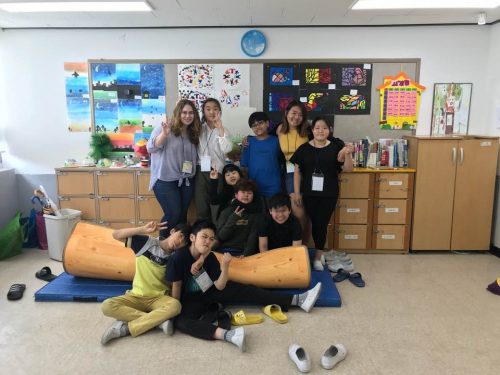
Collaborative Learning
This week was the start in our time at the multicultural school, Chiguchon. After all of my worries and uncertainties, I’m glad to say that they were mostly for nothing. The lesson plans worked for our students, which in my case were fifth grade students, and the two other group members and I assigned to that grade worked well together. Though we did have to improvise a lot based on what was working and what was boring the students to sleep, we did well thinking on our feet. Peining and I found that while songs were effective, our modified version of Hot Potato worked wonders with our kids. They loved being competitive and trying to stay in the game when they were asked a question about the curriculum after being stuck with the “potato”. I even got in on the game and instead of asking me questions in English, the children would think of a question to ask me about Korean vocabulary.
I think seeing me struggle with remembering the vocab they taught me help them see that it was okay to not understand. As I kept getting questioned and asked to review my own vocab words, they worked with me and used some of the same techniques we used with them to teach English. It was really cool to see how invested they were in my learning. The kids looked so proud when I could answer their questions about the seasons, numbers, and a couple animals. The fact that they were using things Peining, Jea, and I had taught them in English to teach me those words in Korean made me feel so proud.
Growth
At the beginning of the week, I had felt a little useless. The students couldn’t communicate with me because their teacher didn’t have a common language to communicate in. It made me feel like I shouldn’t have been there. How can I teach someone when I can’t talk to them? The kids would come up to me asking something, and all I could do was repeat what they were asking me back to them, or even just say “I don’t know” in Korean. However, as the week progressed I saw that though I couldn’t fully communicate, I was still building relationships with my students. They still wanted to try talking to me and asking me questions despite knowing that I would never fully understand their words. Hopefully, as they continue to learn I will also build my own proficiency and be able to communicate with them fully and bridge the language gap we currently have.

Next Week
In the coming week, we will be switching grades. After spending a week with fifth and sixth grades, next week we will be working with third and fourth grades. I am excited to see what modifications we will have to make to our lesson plans. What will work and what won’t with this different demographic? I’m sure you will find out in my blog post next week!
